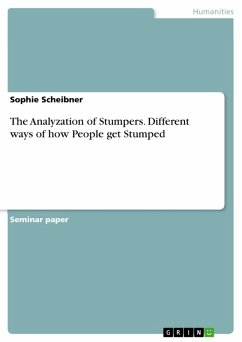
The Analyzation of Stumpers. Different ways of how People get Stumped (eBook, PDF)

PAYBACK Punkte
0 °P sammeln!
Seminar paper from the year 2020 in the subject Sociology - Miscellaneous, grade: 1,3, Christian-Albrechts-University of Kiel (QBER), language: English, abstract: Within the scope of this paper, it shall be answered how people get stumped in different ways. The goal of this paper is to investigate and to find out how stumpers affect people differently and to understand why some people have difficulties to solve specific stumpers, while others do not. Although decisions depend on a large number of different factors, which make them very complex, this paper also aims to give an impression about ...
Seminar paper from the year 2020 in the subject Sociology - Miscellaneous, grade: 1,3, Christian-Albrechts-University of Kiel (QBER), language: English, abstract: Within the scope of this paper, it shall be answered how people get stumped in different ways. The goal of this paper is to investigate and to find out how stumpers affect people differently and to understand why some people have difficulties to solve specific stumpers, while others do not. Although decisions depend on a large number of different factors, which make them very complex, this paper also aims to give an impression about how decision-making affects people's ability to approach and solve stumpers. As problem solving takes place in many different areas of human life, different human cognitive activities are activated in order to approach specific problems. In the case of stumpers, the problems that are to be solved, address different ways of information acquisition and processing. While some people are able to implement the given information correctly and form the right result, some struggle to form a result that actually solves the problem or to form a result at all. At first, the case of stumpers is approached in this paper by stating the definition of terms. In the further course, a distinction between the various types of stumpers is made, followed by an explanation of how stumpers work and how they manage to lead people astray. To do so, four different stumpers of two various types will be analyzed regarding the way they work and the foun- dation they are built on. Each stumper will predominantly be analyzed based on the most outstanding reason why some people fail to solve these specific stumpers. To test and prove the proposed reasons, the results of a questionnaire will also be analyzed and used. The results of the investigation will then be summarized in a conclusion.
Dieser Download kann aus rechtlichen Gründen nur mit Rechnungsadresse in A, B, BG, CY, CZ, D, DK, EW, E, FIN, F, GR, HR, H, IRL, I, LT, L, LR, M, NL, PL, P, R, S, SLO, SK ausgeliefert werden.













